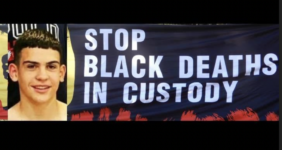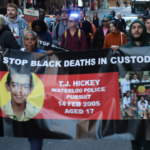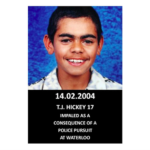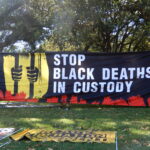Coroner Refers Jai Wright Death in Custody to the DPP for Potential Criminal Charges

Dunghutti teenager Jai Kalani Wright died in hospital on the night following “a head-on collision”, involving an unmarked police car hitting the trail bike he was on at an intersection in the Sydney inner city suburb of Eveleigh in early 2022, in what can only be described as suspect circumstances.
News reports on the day of the incident have NSW police officers reporting having seen a stolen black Mercedes and a blue 2019 Sherco trail bike at an intersection in Newtown a number of hours before the deadly collision took place, and there were reports of “an alleged pursuit”.
Despite the sketchiness of details surrounding how 16-year-old Wright came to have a fatal road accident with a police vehicle, an obvious comparison was drawn to the 2004 death of TJ Hickey, which saw a NSW police van chasing the 17-year-old Gamilaraay boy riding a pushbike to his death.
TJ was pursued by Constable Michael Hollingsworth on 14 February. A police car collided with Jai Wright on 19 February. And while justice remains denied to Hickey, with the two-decade anniversary of his death next Wednesday, there has been a significant development towards justice for Wright.
On commencing the inquest into Wright’s death last week, NSW state coroner Teresa O’Sullivan then suspended proceedings and referred the case to the Director of Public Prosecutions for consideration of criminal charges, which is a move that’s only taken place once before in this state.
Questionable circumstances
O’Sullivan suspended proceedings on 30 January, which was the second day of an inquest expected to take place over a two week period. On the first day of the inquest, the court heard that police were looking for a stolen trail bike, a black Mercedes and also a white BMW.
The Guardian reported that counsel assisting Peggy Dwyer SC had explained that there was no controversy about the cause of Jai’s death – critical head injuries after being thrown from the bike – but the circumstances that found the bike and an unmarked police car coming to impact were.
Dwyer further set out that police had seen these vehicles in Newtown earlier that morning and that police in the area were told over the radio to keep an eye out for these vehicles and they were also instructed not to pursue them.
However, CCTV footage and dashcam video shown in court reveal the police officer driving the unmarked police car swinging out in front of the trail bike, which then hit the law enforcement vehicle at high speed, and shots of the wreckage caused audible gasps during the hearings.
Channel 7 reported on the evening of the accident that “an alleged pursuit through Sydney’s inner west” had occurred, which apparently led to the collision, while the 16-year-old driver of the black Mercedes was arrested 200 metres away, and footage exists of police in fast pursuit of a white car.
Towards accountability
The determination to send the Jai Wright case to the NSW DPP is significant, as social justice advocates been long been raising the point that in this state Aboriginal deaths in custody should warrant more than just the usual coronial assessment without further consequences.
A coronial referral to the DPP has only occurred twice in recent history and each time it was O’Sullivan who made it.
The first occurred in October 2020, during the inquest into the 2019 killing of Wiradjuri man Dwayne Johnston by a Corrective Services NSW officer, who shot him in the back.
The prison guard who remains unnamed was charged with the manslaughter of the First Nations man in February 2021, which was the first time in Australian history a prison guard had received a substantial charge in relation to a First Nations custody death.
This charge was then upgraded to murder in August the following year. However, the prison guard was subsequently found not guilty in November.
And whilst it did remain a judicial decision, at the time of the first referral of an Aboriginal death in custody matter to the DPP was made, it did come at the tail end of months-long grassroots Black death in custody demonstrations, which sprung up in June 2020.
The referral also came as a WA police officer was charged with the murder of Yamatji woman JC, who was surrounded by police at the time she was shot dead because she was holding a knife. The officer, who was the first in the state to be charged with murder in over a century, was acquitted.
In that same state, five officers stood trial for the 1983 manslaughter of Yindjibarndi teenager John Pat, after he was bashed to death by police, who were all then acquitted. And Pat’s death was one of the main triggers for holding the Royal Commission into Aboriginal Deaths in Custody.
And as O’Sullivan made her first referral, NT police constable Zachary Rolfe was awaiting trial after being charged with the murder of 19-year-old Warlpiri man Kumanjayi Walker in November 2019. But despite the circumstances of that killing, Rolfe was acquitted of murder and two lesser charges.
A slow path to justice
The Rolfe acquittal in March 2022 served to cast a shadow on what had appeared to be increasing accountability when it comes to the long-term crisis of Aboriginal deaths in police and corrections custody in this country.
But last week’s referral of the Jai Wright inquest to the DPP does seem to show another step in the slow incremental developments towards any justice in the wake of these deaths. However, small victories like these are tempered as they’re the result of unjust killings and neglect.
“Jai is one of at least 558 Aboriginal and Torres Strait Islander people who have died in custody and police operations in a little over 30 years since the Royal Commission,” Aboriginal Legal Service NSW/ACT chief executive Karly Warner said in a statement following last week’s decision.
“Scrutiny and accountability are essential in stopping this national shame.”







